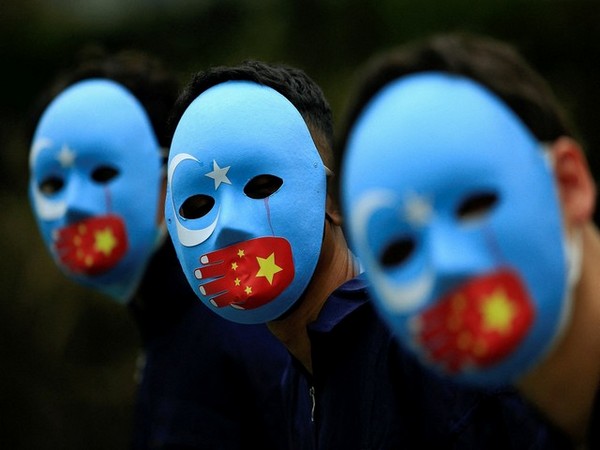Uyghurs face cumulative 4.4 million years imprisonment under China’s communist regime’s persecution: Report
A recent analysis from the United States’ Yale University highlights the staggering impact of the Chinese Communist Party’s (CCP) campaign against Uyghurs and other Turkic minorities in Xinjiang region, estimating a cumulative 4.4 million years of prison sentences.
The report from Yale’s Macmillan Center for Genocide Studies indicates that the Chinese regime has shifted from mass arbitrary detentions to a legally dubious framework for imprisoning individuals.
According to the report, researchers, led by human rights lawyer Rayhan Asat, analyzed 13,000 cases from the Xinjiang Victims Database, finding an average sentence of 8.8 years.
This figure was extrapolated from 540,000 prosecutions reported by the Xinjiang High People’s Procuratorate between 2017 and 2021, as per the report, which warns that the dataset represents only a fraction of the true extent of the repression, with nearly 90 percent of cases lacking public records.
According to a report by The Diplomat, the fresh information about ongoing, systematic, and widespread Chinese government atrocity crimes in the Uyghur region – where millions of people have been arbitrarily detained, tortured, separated from family members, and subjected to cultural persecution, simply because of their distinct identity – demonstrates strong support for the real trend of international accountability.
In the newly published analysis of patterns of incarceration and legal manipulation, researchers tallied the number of years of wrongful detention inflicted on Uyghurs: “a cumulative total of 4.4 million years of imprisonment.”
The authors argue the Chinese regime’s genocide and crimes against humanity also reflect a disturbing attempt at “authoritarian lawfare” – in effect, that the the country’s authorities have continued to try to justify their patently illegal conduct by calling it the opposite, while the tactic is designed to minimize international scrutiny and discourage the pursuit of accountability, reports The Diplomat.
“Using official data released by the Xinjiang High People’s Procuratorate, the Chinese government, documentation by civil society and courageous family members of victims, the report finds that China’s ongoing mass imprisonment of the Uyghurs will cost the ethnic group a conservative estimate of 4.4 million cumulative years of life, stripping them of any chance at a thriving cultural existence,” a press release from Yale Macmillan Centre’s Genocide Studies Programme read.
However, the report emphasizes that the Xinjiang Victims Database “is not comprehensive” and that the “actual numbers are far more significant.”
“Almost 90 [percent] of criminal records in Xinjiang are not public, even though legal records in other Chinese regions are, meaning that records of hundreds of thousands of Uyghurs who are known to be imprisoned were unavailable for the context of this particular analysis,” as per the report.
Commenting on the research, David Simon, Director of Yale Genocide Studies Programme, said, “The systematic persecution of China’s Uyghur population is hardly a secret, but we are always learning more about the depths and extent of it. This report shows the extent to which a policy of mass incarceration has been used not only to silence opponents of the regime but also to threaten the very existence of the Uyghur identity.”
“Asat and Kim demonstrate yet another reason it is entirely appropriate to ask whether the crimes committed against the Uyghurs might constitute genocide, and why policy responses that take that into account are justified,” Simon said.
Rayan Asat, a coauthor of the report, commented, “While the Chinese government violates both Chinese and international laws, it weaponizes authoritarian lawfare to perpetrate violence against the citizenry, especially those marginalized. Thus, China’s legalized authoritarianism enables the State to freely use its legal machinery to punish its enemy.”
“The enemy line is often defined as activists, journalists, or critics of the regime, but it can be redefined as the regime continues to choose new targets as enemies to its survival. The citizens can never know where the line lies, as one day farmers who object to the state expropriating their property can become enemies,” Asat said.
“We hope this report not only contributes to the ongoing documentation of crimes against humanity and genocide but serves a wake-up call to the countries in the global south which for nearly a decade has remained bystanders in the face of China’s economic influence,” the human rights lawyer added.
The researchers said in the report that Uyghurs face what they call “ethnic incapacitation,” meaning that individual Uyghurs may survive, but the “community will collapse, disperse, and lose all substance without a majority of its members to maintain it.”
“With every additional day of Uyghur incarceration, ethnic incapacitation progressively becomes more of a reality,“ the researchers wrote.
”If the Uyghur population continues to be barred from maintaining their communities, it is only a matter of time before full ethnic incapacitation is realized and the damage is irreversible,” they added.
The report also offers some recommendations to stop Beijing’s persecution of Uyghurs, including having member states of the United Nations (UN) “activate all accountability mechanisms to compel China.”
The Yale report also calls on the UN Human Rights Council and the Office of the UN High Commissioner for Human Rights to “take a collective stance” against the persecution.













